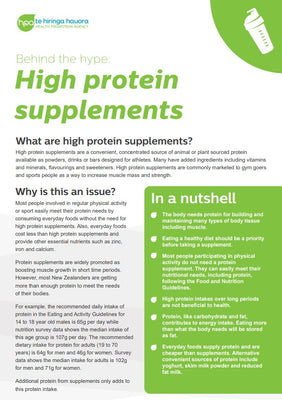Behind the hype: High protein supplements - NPA129

The two-page Behind the Hype information sheets contain evidence-based advice to help you provide clear consistent information to consumers. Protein supplements are increasingly popular with people playing sports or working out. This information sheet explains why most people involved in regular physical activity don't require supplements.
The full resource:
Behind the hype: High protein supplements
In a nutshell
-
The body needs protein for building and maintaining many types of body tissue including muscle.
-
Eating a healthy diet should be a priority before taking a supplement.
-
Most people participating in physical activity do not need a protein supplement. They can easily meet their nutritional needs, including protein, following the Food and Nutrition Guidelines.
-
High protein intakes over long periods are not beneficial to health.
-
Protein, like carbohydrate and fat, contributes to energy intake. Eating more than what the body needs will be stored as fat.
-
Everyday foods supply protein and are cheaper than supplements. Alternative convenient sources of protein include yoghurt, skim milk powder and reduced fat milk.
What are high protein supplements?
High protein supplements are a convenient, concentrated source of animal or plant sourced protein available as powders, drinks or bars designed for athletes. Many have added ingredients including vitamins and minerals, flavourings and sweeteners. High protein supplements are commonly marketed to gym goers and sports people as a way to increase muscle mass and strength.
Why is this an issue?
Most people involved in regular physical activity or sport easily meet their protein needs by consuming everyday foods without the need for high protein supplements. Also, everyday foods cost less than high protein supplements and provide other essential nutrients such as zinc, iron and calcium.
Protein supplements are widely promoted as boosting muscle growth in short time periods. However, most New Zealanders are getting more than enough protein to meet the needs of their bodies.
For example, the recommended daily intake of protein in the Eating and Activity Guidelines for 14 to 18 year old males is 65g per day while nutrition survey data shows the median intake of this age group is 107g per day. The recommended dietary intake for protein for adults (19 to 70 years) is 64g for men and 46g for women. Survey data shows the median intake for adults is 102g for men and 71g for women.
Additional protein from supplements only adds to this protein intake.
Having more protein than you need does not result in additional improvements to muscle strength or recovery and may affect your long term health. Eating and drinking more protein than your body requires will contribute to excess energy in the diet, can increase calcium losses from the body (weakening bones over time) and may cause extra strain on the kidneys to get rid of protein waste products.
Food sources of protein
The body needs protein to build, maintain and repair many types of body tissue. Proteins are made up of amino acids from which the body produces new proteins to make muscle cells, enzymes, hormones and many other substances in the body. Protein can also be a source of energy for the body. Protein is found in both animal and plant-based foods.
| Animal |
Plant |
|
|
Animal protein contains all essential amino acids the body needs while plant protein doesn’t. By choosing a variety of foods that contain protein, vegetarians and non-vegetarians will achieve an adequate supply of amino acids.
References
Ministry of Health. 2012. Food & Nutrition Guidelines for Healthy Children and Young People (aged 2-18years). Wellington: Ministry of Health
Healthy eating, active living - HE1518 – HealthEd
NHMRC. 2006. Nutrient Reference Values for Australia and New Zealand including Recommended Dietary Intakes. Canberra: National Health and Medical Research Council; Wellington: Ministry of Health.
University of Otago and Ministry of Health. 2011. A Focus on Nutrition: Key findings of the 2008/2009 New Zealand Adult Nutrition Survey. Wellington: Ministry of Health
This resource is for digital download only.